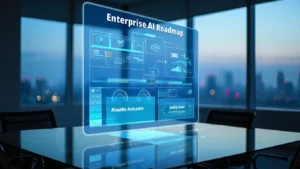- Productionizing AI Agents: Prepare data, train models, and integrate AI agents with existing systems for real-world use in the agentic age.
- Deploying AI Agents: Use the right tools and infrastructure to deploy AI agents, optimizing for speed and security.
- Scaling AI Agents: Scale AI agents with Gemini through automated monitoring, continuous learning, and efficient resource management.
Introduction: Entering the Agentic Age
Artificial intelligence (AI) is making significant strides, evolving from simple tools to autonomous systems that can execute tasks independently. This new era, often referred to as the Agentic Age, marks a transformative shift where AI agents are revolutionizing industries by operating with minimal human oversight. These agents can learn from their environment, make decisions, and adapt to real-world conditions.
At the forefront of this transformation is Gemini, a powerful AI platform designed to help businesses effectively build, deploy, and scale AI agents. This article will guide you through the key processes involved in productionizing, deploying, and scaling AI agents, while highlighting how Gemini plays a crucial role in making this possible.
Understanding AI Agents: What They Are and Why They Matter
Definition of AI Agents
AI agents are a specific type of artificial intelligence designed to act autonomously within their environment. Unlike traditional AI models, which rely on pre-programmed rules and inputs, AI agents are self-sufficient, able to make decisions, learn from their surroundings, and adjust their actions based on new data or changing conditions. These agents are designed to perform complex tasks without requiring direct supervision, making them invaluable in dynamic and fast-paced environments.
Key characteristics of AI agents include:
- Autonomy: The ability to make independent decisions based on available data and environmental feedback.
- Learning: Continuous improvement through reinforcement learning or other adaptive techniques.
- Environment Interaction: Real-time responses to changes, whether in a digital or physical context.
Applications of AI Agents
AI agents are already having a noticeable impact across various industries. Some prominent applications include:
- Virtual Assistants: AI-powered tools like Siri, Alexa, and Google Assistant respond to user commands, providing information, and learning over time to offer personalized assistance.
- Customer Support: AI chatbots capable of handling customer inquiries, solving problems, and escalating issues to human representatives when necessary.
- Logistics Optimization: AI agents can manage inventory, optimize delivery routes, and improve warehouse operations in real-time, making supply chains more efficient.
- Robotics: In sectors such as manufacturing or healthcare, autonomous robots powered by AI agents can perform complex, repetitive, or hazardous tasks with precision.
Why Scaling AI Agents Is Important
As AI agents become more integrated into business processes, the need to scale them grows exponentially. Scaling AI agents allows companies to:
- Handle larger volumes of data and more complex tasks.
- Operate in a broader range of environments.
- Support larger user bases, which is critical for industries that process significant data or face high demand, such as finance, healthcare, and logistics.
By scaling multiple AI agents, businesses can improve efficiency, reduce costs, and remain competitive in an increasingly digital world.
Productionizing AI Agents: From Development to Real-World Implementation
What Does ‘Productionizing’ Mean?
Productionizing AI agents involves transitioning them from the development stage to real-world use. This process ensures that the AI agents are robust, scalable, and able to function in dynamic environments. Moving AI agents into production requires careful planning, as it involves dealing with live data, integrating with existing systems, and ensuring the agents perform reliably under real-world conditions.
Steps for Productionizing AI Agents
1. Data Preparation
Data is the foundation of any AI agent. Ensuring that the data is accurate, relevant, and well-organized is essential for the agent’s success. This step involves:
- Data Collection: Acquiring the necessary data from various sources, including databases, sensors, or external APIs.
- Data Cleaning: Removing any inaccuracies, duplicates, or noise to ensure the data is high-quality.
- Data Structuring: Organizing the data in a way that is usable by the AI models.
2. Training and Testing
AI agents need to be trained to perform their tasks effectively. This training is done through a combination of supervised learning (where the agent learns from labeled examples) and reinforcement learning (where the agent learns through trial and error in a simulated environment).
Testing the agent in controlled environments helps identify potential weaknesses before deploying it to handle real-world tasks. Simulation environments allow businesses to safely test AI agents’ decision-making capabilities under various scenarios.
3. Integration with Systems
For AI agents to function effectively, they need to integrate seamlessly with existing IT infrastructure. This integration process includes:
- Connecting the agent to databases, APIs, and other relevant systems.
- Ensuring compatibility with existing software or hardware tools.
- Testing the integration to guarantee smooth operation within the organization’s workflow.
Best Practices for Productionizing AI Agents
- Continuous Monitoring: Once deployed, AI agents should be continuously monitored to identify performance issues, ensure they meet expected benchmarks, and avoid any potential disruptions.
- Validation and Adjustment: Regular validation of the AI agent’s performance is crucial. As new data becomes available, retraining and adjusting the model ensures that the agent stays effective and relevant.
Deploying AI Agents: Overcoming Technical and Operational Challenges
Choosing the Right Infrastructure
A key aspect of deploying AI agents is selecting the appropriate infrastructure. Businesses typically choose between:
- Cloud-based Deployment: Ideal for scalability and flexibility. Cloud platforms like AWS, Azure, and Google Cloud offer robust tools and infrastructure for deploying AI agents at scale.
- On-premise Deployment: Offers greater control over data security and compliance, which is especially important in industries with strict regulatory requirements, such as finance or healthcare.
Tools and Platforms for Deployment
Several tools and platforms simplify the deployment process by automating key steps. Popular tools include:
- Kubernetes: Automates the deployment and scaling of containerized applications, which helps with managing large-scale AI agent operations.
- Docker: Packages applications into containers, making it easy to move and deploy them across different environments.
- Gemini: A comprehensive platform that supports the deployment of AI agents with a focus on scalability, security, and integration with existing business systems.
Challenges in Deployment
1. Latency and Speed
In many cases, these agents need to respond in real-time, such as in autonomous driving or real-time decision-making systems. Latency issues can lead to delays, which may result in poor performance. Addressing latency requires optimizing the underlying infrastructure and ensuring the deployment environment can handle the agent’s processing needs.
2. Security and Compliance
In industries like healthcare and finance, deploying AI agents requires stringent security and compliance protocols. Ensuring that the agents meet industry standards for data protection and privacy is a critical part of the deployment process.
People Also Ask
- What does it mean to productionize AI agents?
Productionizing AI agents refers to the process of transitioning them from development to live, real-world applications. This involves preparing data, training the agents, and integrating them with existing systems to ensure they perform reliably in dynamic environments. - Why is scaling AI agents important?
Scaling AI agents is crucial for increasing their capacity to handle large data volumes, more users, and more complex tasks. It enables businesses to expand their operations efficiently while maintaining high performance and reliability. - How does Gemini help with deploying AI agents?
Gemini simplifies the deployment of AI agents by providing tools that support scalability, security, and integration with existing business systems. It ensures that AI agents can be deployed and managed effectively across various environments. - What are the key challenges in deploying AI agents?
Some major challenges in deploying AI agents include managing latency, ensuring security and compliance, and integrating agents with existing IT infrastructure. Addressing these issues is essential for optimal agent performance in real-time applications.
Case Study: Gemini in Logistics
Gemini has successfully deployed AI agents in the logistics industry, helping companies streamline operations by optimizing routes, managing inventory in real-time, and predicting delivery times. By integrating agents with existing logistics systems, Gemini enables businesses to reduce operational costs while improving service quality.
Scaling AI Agents: Growing Beyond Initial Deployment
Why Scaling Matters
Once these agents are successfully deployed, the next step is scaling their capabilities. Scaling AI agents allows businesses to:
- Support more users and handle more data.
- Expand into new environments and geographies.
- Perform increasingly complex tasks without compromising performance.
Approaches to Scaling AI Agents
1. Horizontal Scaling
This method involves increasing the number of agents across different environments to share the workload. By duplicating agents, businesses can handle higher demand and ensure that each agent maintains high performance, even as the volume of tasks increases.
2. Vertical Scaling
Vertical scaling focuses on enhancing the capacity of individual AI agents. By increasing computational power or adding more sophisticated algorithms, businesses can enable each agent to handle more complex tasks or process larger datasets.
Technical Challenges in Scaling
While scaling AI brings many benefits, it also presents challenges such as:
- Resource Limitations: As the number of agents increases, so do the demands for processing power, memory, and storage.
- Coordination: Multiple AI agents need to work together without causing conflicts or duplicating efforts.
- Performance Consistency: Ensuring agents perform reliably across different environments is crucial as they scale.
Best Practices for Scaling AI Agents
1. Automated Monitoring and Management
Automated monitoring tools can help track agent performance and automate troubleshooting tasks, such as restarting agents or balancing workloads. This ensures that agents continue to function optimally as they scale.
2. Continuous Learning and Updates
To remain effective, AI agents should continue learning from new data and receiving updates to improve their performance. Regular updates and retraining keep agents adaptable and relevant as they scale.
The Role of Gemini in the Agentic Age: Why It’s a Game-Changer
What Is Gemini?
Gemini is a state-of-the-art AI platform that helps businesses deploy and scale AI agents efficiently. By offering a comprehensive set of tools for integration, deployment, and management, Gemini makes it easier for businesses to unlock the full potential of AI agents.
Key Features of Gemini
- Scalability: Gemini’s infrastructure is designed to grow with your business, whether you’re managing a small operation or deploying thousands of AI agents.
- Ease of Use: Gemini offers intuitive interfaces and robust automation, allowing businesses to deploy and manage AI agents with minimal technical expertise.
- Advanced AI Training: Gemini supports cutting-edge AI training techniques, ensuring agents can continuously improve over time.
Ethical and Operational Considerations in Scaling AI Agents
Ethical AI
As AI agents become more widespread, it’s essential to consider the ethical implications of their use. Key ethical concerns include:
- Bias: AI agents must be designed to avoid biases in decision-making.
- Transparency: Businesses should ensure the decisions made by AI agents are understandable and explainable.
- Accountability: Even as AI agents take on more tasks, there must be clear lines of responsibility to ensure accountability.
Operational Concerns
Over-reliance on AI agents can lead to potential risks, such as reduced human oversight or vulnerabilities to system failures. Businesses must ensure that AI agents are part of a balanced approach to automation, where human intervention remains an option when necessary.
Ensuring Responsible AI Growth
Companies can promote responsible AI growth by adopting governance frameworks that focus on fairness, transparency, and accountability. Ensuring AI agents are used responsibly benefits both the organization and society at large.
Shaping the Future of the Agentic Age
The Agentic Age is upon us, offering incredible opportunities for businesses willing to invest in AI agents. By effectively building, deploying, and scaling AI agents using platforms like Gemini, companies can drive innovation, improve efficiency, and remain competitive in today’s fast-changing market. It’s crucial for businesses to embrace AI not just for automation, but to strategically enhance their capabilities.









